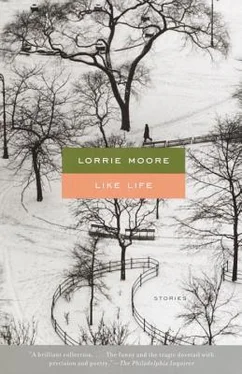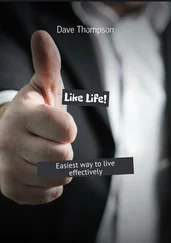John sat down. “What’s this?” He pointed to the Metropolitan Museum of Art. “I’m not that keen to go to museums. We always went to the British Museum for school. My sister likes that kind of stuff, but not me.”
“These are only suggestions,” said Millie. She placed a muffin and a quartered orange in front of him.
John smiled appreciatively. He picked up a piece of orange, pressed it against his teeth, and sucked it to a damp, stringy mat.
“I can drive you to the station to catch the ten-o-two train, if you want to leave in fifteen minutes,” said Millie. She slid sidesaddle into a chair and began eating a second muffin. Her manner was sprinkled with youthful motions, as if her body were on occasion falling into a memory or a wish.
“That would be lovely, thanks,” said John.
“Did you really not like living in England?” asked Millie, but they were both eating muffins, and it was hard to talk.
At the station she pressed a twenty into his hand and kissed him on the cheek. He stepped back away from her and got on the train. “See a play,” Millie mouthed at him through the window.
AT DINNER it was just she and Hane. Hane was talking about Jesus again, the Historical Jesus, how everyone misunderstood Christ’s prophetic powers, how Jesus himself had been mistaken.
“Jesus thought the world was going to end,” said Hane, “but he was wrong. It wasn’t just Jerusalem. He was predicting the end for the whole world. Eschatologically, he got it wrong. He said it outright, but he was mistaken. The world kept right on.”
“Perhaps he meant it as a kind of symbol. You know, poetically, not literally.” Millie had heard Hane suggest this himself. They were his words she was speaking, one side of his own self-argument.
“No, he meant it literally,” Hane barked a little fiercely.
“Well, we all make mistakes,” said Millie. “Isn’t the world funny that way.” She always tried to listen to Hane. She knew that few students registered for his courses anymore, and those that did tended to be local fundamentalists, young ignorant people, said Hane, who had no use for history or metaphor. They might as well just chuck the Bible! In class Hane’s primary aim was reconciling religion with science and history, but these young “Pentecostalists,” as Hane referred to them, didn’t believe in science or history. “They’re mindless, some of these kids. And if you want your soul nourished — and they do, I think — you’ve got to have a mind.”
“Cleanliness is next to godliness,” said Millie.
“What are you talking about?” asked Hane. He looked depressed and impatient. There were times when he felt he had married a stupid woman, and it made him feel alone in the world.
“I’ve been thinking about the garbage barge,” said Millie. “I guess my mind’s wandering around, just like that heap of trash.” She smiled. She had been listening to all the reports on the barge, had charted its course from Islip, where she had relatives, to Morehead City, where she had relatives. “Imagine,” she had said to her neighbor in their backyards, near the prize tulips that belonged to neither one of them. “Relatives in both places! Garbagey relatives!”
Millie wiped her mouth with her napkin. “It has nowhere to go,” she said now to her husband.
Hane served himself more leftovers. He thought of Millie and this interest of hers in ecology. It baffled and awed him, like a female thing. In the kitchen Millie kept an assortment of boxes for recycling household supplies. She had boxes marked Aluminum, Plastic, Dry Trash, Wet Trash, Garbage. She had twice told him the difference between garbage and trash, but the distinction never meant that much to him, and he always forgot it. Last night she had told him about swans in the park who were making their nests from old boots and plastic six-pack rings. “Laying their eggs in litter,” she’d said. Then she told him to be more fatherly toward John Spee, to take a friendly interest in the boy.
“Is this the end of the leftovers?” asked Hane. At his office at the college he ate very light lunches. Often he just brought a hard-boiled egg and sprinkled it carefully with salt, shaking the egg over the wastebasket if he got too much on by mistake.
“This is it,” said Millie, standing. She picked up the skillet, and taking a serving spoon, scraped and swirled up the hardened, flat-bottomed remnants. “Here,” she said, holding it all in front of Hane. “Open up.”
Hane scowled. “Come on, Millie.”
“Just one last spoonful. Tomorrow I cook fresh.”
Hane opened his mouth, and Millie fed him gently, carefully, because the spoon was large.
Afterward they both sat in the living room and Hane read aloud a passage from 2 Thessalonians. Millie stared off like a child at the figurines, the clown and the ballerina, and thought about Ariel, traveling to foreign countries and meeting people. What it must be like to be young today, with all those opportunities. Once, last semester, before she’d left for England, Ariel had said, “You know, Mom, there’s a girl in my class at Rutgers with exactly your name: Mildred Keegan. Spelled the same and everything.”
“Really?” exclaimed Millie. Her face had lit up. This was interesting.
But Ariel was struck with afterthought. “Yeah. Only … well, actually she flunked out last week.” Then Ariel began to laugh, and had to get up and leave the room.
AT NINE O’CLOCK, after she had peeled the labels off an assortment of tin cans, and rinsed and stacked them, Millie went to pick up John Spee at the train station.
“So what all did you do in the city?” asked Millie, slowing for a red light and glancing at the boy. She had left the house in too much of a rush, and now, looking quickly in the rearview mirror, she attempted to smooth the front of her hair, which had fallen onto her forehead in a loose, droopy tangle. “Did you see a play? I hear there’s some funny ones.” Millie loved plays, but Hane didn’t so much.
“No, didn’t feel like buzzing the bees for a play.” He said ply.
“Oh,” said Millie. Her features sagged to a slight frown. Buzzing the bees. Ariel had used this expression once. Money, honey, bees , Ariel had explained impatiently. Get it? “Did you go down to Battery Park and see the Statue of Liberty? It’s so beautiful since they cleaned it.” Not that Millie had seen it herself, but it was in all the newsmagazines a while back, and the pictures had made it seem very holy and grand.
The light turned green, and she swung the car around the corner. At night this part of New Jersey could seem quiet and sweet as a real hometown.
“I just walked around and looked at the buildings,” said John, glancing away from her, out the car window at the small darkened business district of Terracebrook. “I went to the top of the Empire State Building, and then I went back and went to the top again.”
“You went twice.”
“Twice, yeah. Twice.”
“Well, good!” Millie exclaimed. And when they pulled into the driveway, she exclaimed it again. “Well, good!”
“SO HOW WAS the city?” boomed Hane, rising stiff and hearty, so awkwardly wanting to make the boy feel at home that he lunged at him a bit, big and creaky in the joints from having been sitting and reading all evening.
“Fine, thank you,” said John, who then went quickly to his room.
Millie gave Hane a worried look, then followed and knocked on John’s door. “John, would you like some supper? I’ve got a can of soup and some bread and cheese for a sandwich.”
“No, thank you,” John called through the door. Millie thought she heard him crying — was he crying? She walked back into the living room toward Hane, who gave her a shrug, helpless, bewildered. He looked at her for some reassuring word.
Читать дальше












